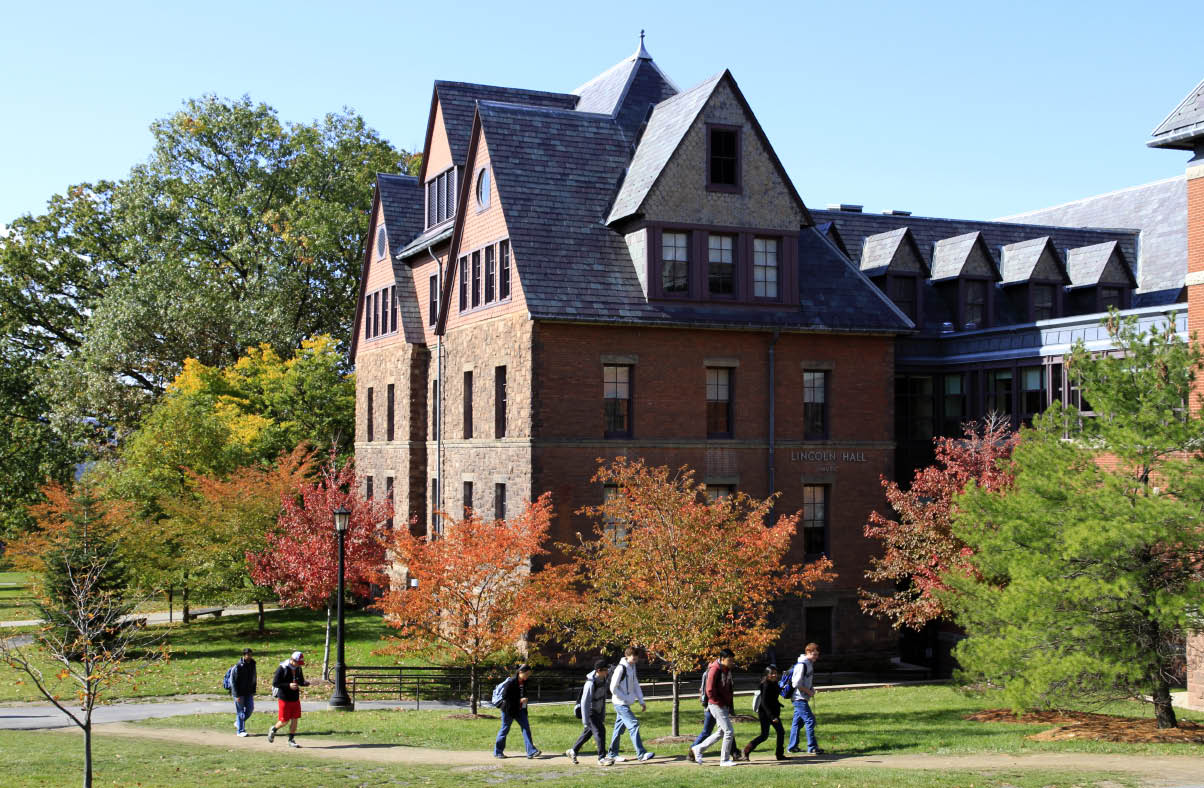|
Brains, Plus the Charm Offensive
Most applicants to American colleges believe good English to be essential for admission. Lin Bai is a Beijing high-school student with aspirations to spend time in America. Besides registering for English classes, he regularly participates in English practice activities organized by universities near his home. One-third of the students he meets there are high school students who share an ambition to study abroad.
 |
| The high-quality resources, different educational concepts, and teaching methods offered by American universities are proving attractive to Chinese students. |
For applicants to overseas postgraduate programs another key factor determining admission is the academic track record. According to Tang Jiang, the selection process for doctoral candidates stresses academic background and research ability: the undergrad GPA (Grade Point Average) test may speak louder than their GRE (Graduate Record Examinations) score.
The application process is particularly demanding for high school students. Ding Siyu has to prepare for the SAT examination, and at the same time preview the final year's curriculum so as to be ready to take China's college entrance exam in case she is turned down by American colleges.
Not everything stands or falls on academic performance; extra-curricular interests can also play a part. Ding Siyu's cousin Ma Yuanyuan used to run her school's radio station and often did voluntary extracurricular work. It didn't hurt that she is a good dancer, played the Guzheng (a traditional Chinese musical instrument), and won various international awards. These miscellaneous accomplishments eventually landed her a place in the University of Denver.
In addition to meeting requirements on personal ability, applicants should also adopt certain application strategies. The chance of an offer increases if one applies to multiple universities at different levels based on one's personal circumstances. Tang Jiang sent application letters to 16 universities he selected from a list of the leading 150 American universities and received two offers.
Specialist Services Spring Up
With more and more Chinese intending to study abroad, specialist educational organizations have sprung up, all trying to grab a piece of this growing market. Recent years have seen the emergence of "international schools" or "high schools with international classes." Not facilities exclusive to the children of foreign nationals in China, these are designed to attract Chinese students by offering a bilingual, internationalized education. They claim to help students pass various foreign examinations, such as IGCES (International General Certificate of Secondary Education), SAT, IB (International Baccalaureate) and AP (Advanced Placement) and prepare them more thoroughly for undergraduate study overseas. Currently there are over 40 international schools in Beijing.
Despite an eye-stinging tuition in excess of RMB 100,000 per year, many rich families favor these schools. "In an international school my son can get accustomed to the foreign educational system in advance and he'll be spared the pressure of our college entrance exam. I think it's money well spent," says Guo Wei, who runs a law office in Shanghai. He sent his son to a bilingual primary boarding school and then a top international middle school in the city.
In response to the surging demand for instruction in the English language, language-training institutions have appeared in large numbers. The New Oriental School is perhaps the most successful. Since its founding in 1993, New Oriental has enrolled over 10 million students. The company has grown into the largest and best known provider of private educational services in China, those services covering preparation for TOEFL, IELTS (International English Language Testing System), GRE, GMAT (Graduate Management Admission Test), LSAT (Law School Admission Test) and SAT. Zhou Rong, a senior teacher in the North America Department, has won the affectionate nickname "Mother Harvard" because she has helped so many students win offers from top American universities, including Harvard, Massachusetts Institute of Technology, University of Pennsylvania and Stanford.
In order to attract outstanding high school grads, some Chinese universities, such as Peking University, Tsinghua, Fudan and Shanghai Jiaotong, have launched exchange programs with their foreign counterparts. These programs permit and arrange one or two years' undergraduate study at a foreign university. For example, Peking University cooperates with Yale and the University of Chicago. Sun Lingxia, a sophomore studying food science at Sichuan University, was able to complete two years at New Mexico State University.
The need for professional assistance with the application process has spawned a cohort of international education agencies, who claim to provide individualized services for student visa applicants and other support for students trying to achieve their educational goals. Edu-Global China, for instance, boasts of its ties with many foreign universities' China offices, and its alliance with Navitas, a diversified education service provider.
In turn, successful applicants like to help other candidates. Yu Chong, a communication studies major, makes special mention of the helping hand he got from the website Taisha, a forum for the exchange of experience between students wanting to study overseas or already doing so. Through the forum Yu made a circle of friends who helped and encouraged each other to reach their goals: together they prepared for the language tests, discussed how to improve their personal statements, and how to respond to questions from visa officials.
Such specialists, professional or amateur, have greatly helped Chinese students to achieve their international educational goals.
| 